University ADR 10: Mediation Report on International Laws, 2020
VerifiedAdded on 2022/08/19
|12
|3422
|15
Report
AI Summary
This report delves into the multifaceted world of mediation, an alternative dispute resolution method. It begins with a comprehensive introduction, defining mediation and its role in resolving conflicts outside of traditional court proceedings. The report explores various types of mediation, including facilitative, court-mandated, evaluative, transformative, Med-Arb, Arb-Med, and e-mediation, providing detailed explanations of each approach. Furthermore, it analyzes the advantages and shortcomings of mediation, highlighting its confidentiality, speed, and cost-effectiveness while also acknowledging potential drawbacks. The report also touches upon the methods of enforceability of mediated settlement agreements and concludes with a discussion of mediation's significance, particularly in international contexts such as the UAE. The report is supported by a bibliography of secondary sources, including books, journals, and websites.

[Mediation]
2020
University
Student Credentials
2020
University
Student Credentials
Paraphrase This Document
Need a fresh take? Get an instant paraphrase of this document with our AI Paraphraser
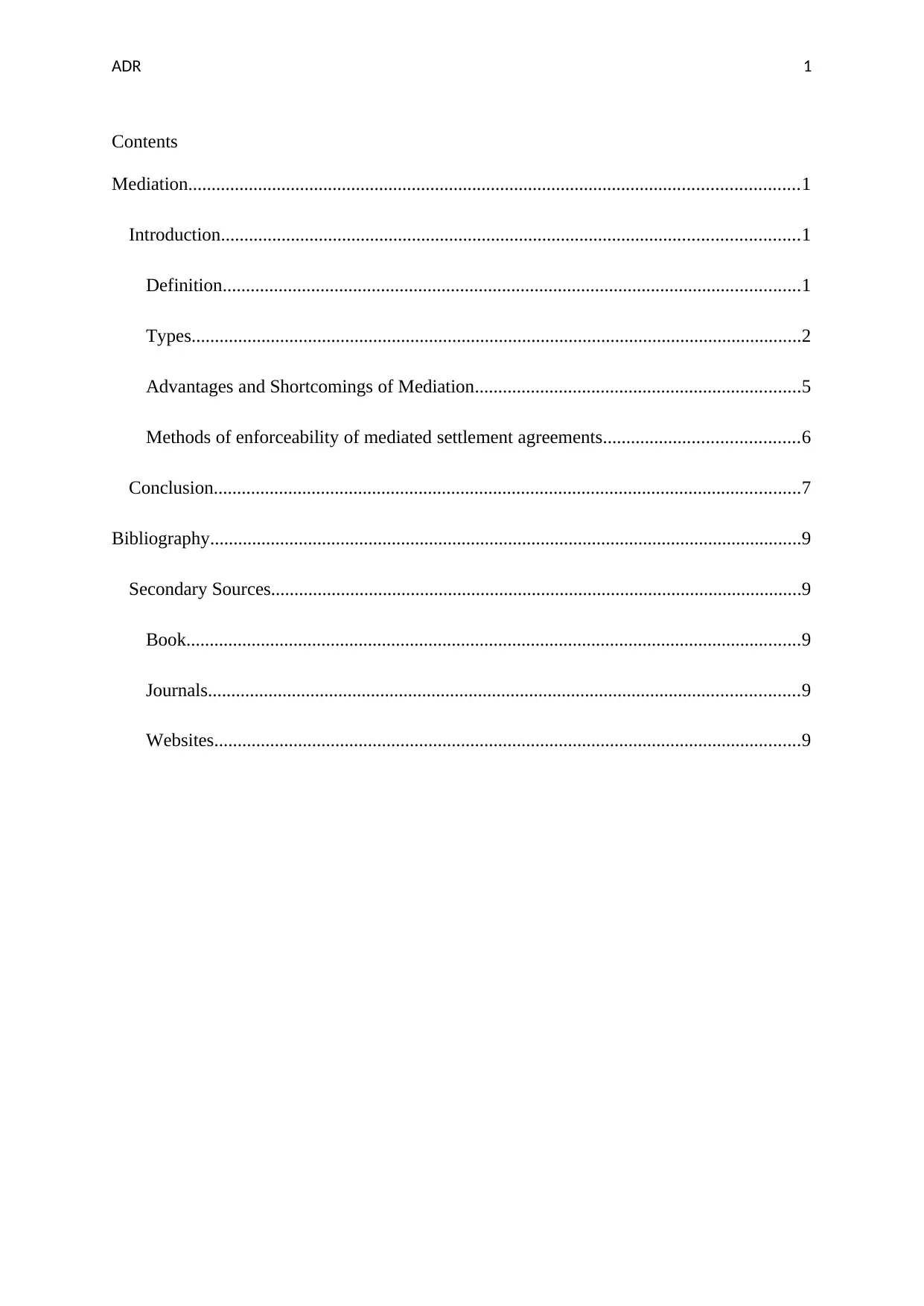
ADR 1
Contents
Mediation...................................................................................................................................1
Introduction............................................................................................................................1
Definition............................................................................................................................1
Types...................................................................................................................................2
Advantages and Shortcomings of Mediation......................................................................5
Methods of enforceability of mediated settlement agreements..........................................6
Conclusion..............................................................................................................................7
Bibliography...............................................................................................................................9
Secondary Sources..................................................................................................................9
Book....................................................................................................................................9
Journals...............................................................................................................................9
Websites..............................................................................................................................9
Contents
Mediation...................................................................................................................................1
Introduction............................................................................................................................1
Definition............................................................................................................................1
Types...................................................................................................................................2
Advantages and Shortcomings of Mediation......................................................................5
Methods of enforceability of mediated settlement agreements..........................................6
Conclusion..............................................................................................................................7
Bibliography...............................................................................................................................9
Secondary Sources..................................................................................................................9
Book....................................................................................................................................9
Journals...............................................................................................................................9
Websites..............................................................................................................................9
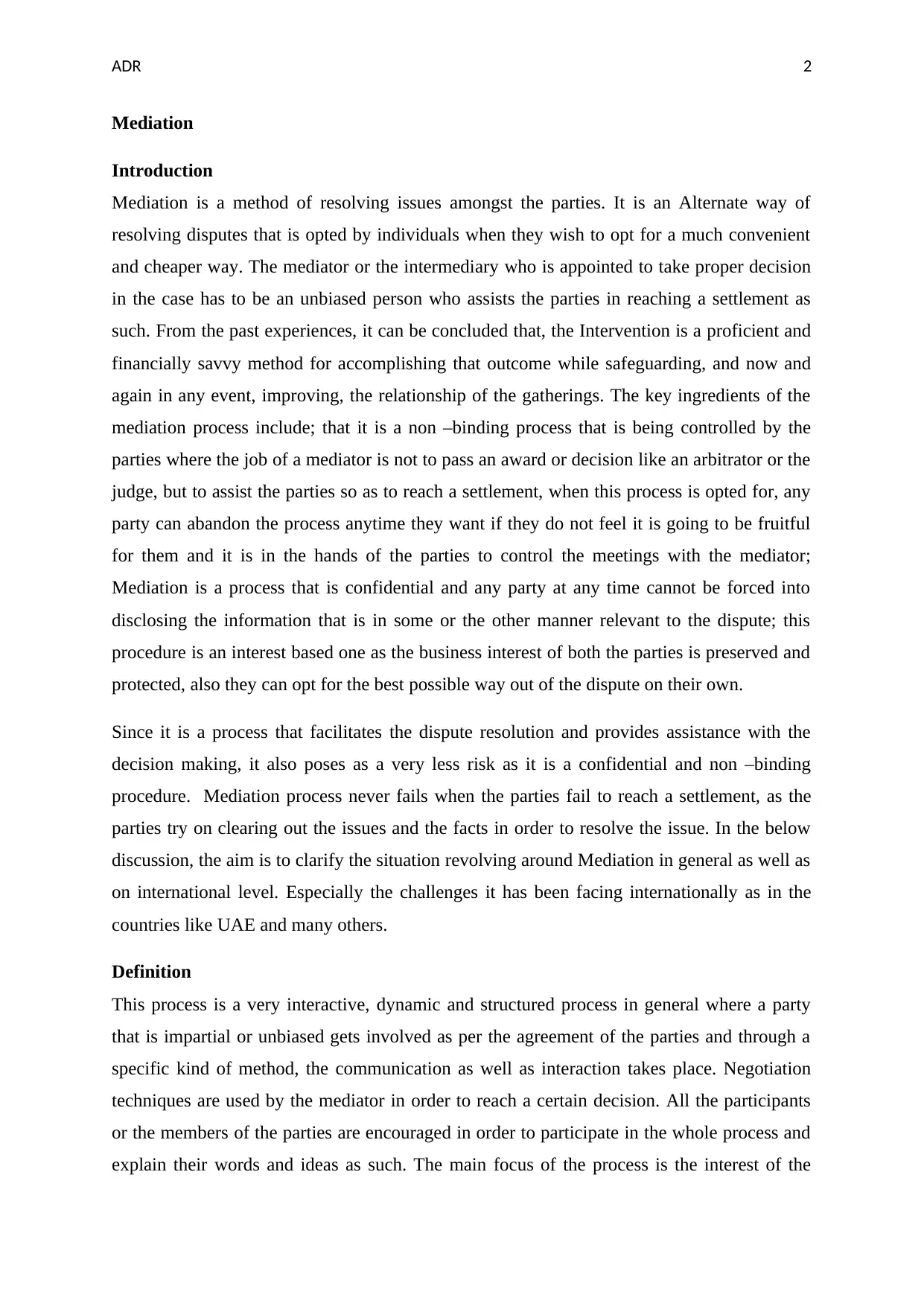
ADR 2
Mediation
Introduction
Mediation is a method of resolving issues amongst the parties. It is an Alternate way of
resolving disputes that is opted by individuals when they wish to opt for a much convenient
and cheaper way. The mediator or the intermediary who is appointed to take proper decision
in the case has to be an unbiased person who assists the parties in reaching a settlement as
such. From the past experiences, it can be concluded that, the Intervention is a proficient and
financially savvy method for accomplishing that outcome while safeguarding, and now and
again in any event, improving, the relationship of the gatherings. The key ingredients of the
mediation process include; that it is a non –binding process that is being controlled by the
parties where the job of a mediator is not to pass an award or decision like an arbitrator or the
judge, but to assist the parties so as to reach a settlement, when this process is opted for, any
party can abandon the process anytime they want if they do not feel it is going to be fruitful
for them and it is in the hands of the parties to control the meetings with the mediator;
Mediation is a process that is confidential and any party at any time cannot be forced into
disclosing the information that is in some or the other manner relevant to the dispute; this
procedure is an interest based one as the business interest of both the parties is preserved and
protected, also they can opt for the best possible way out of the dispute on their own.
Since it is a process that facilitates the dispute resolution and provides assistance with the
decision making, it also poses as a very less risk as it is a confidential and non –binding
procedure. Mediation process never fails when the parties fail to reach a settlement, as the
parties try on clearing out the issues and the facts in order to resolve the issue. In the below
discussion, the aim is to clarify the situation revolving around Mediation in general as well as
on international level. Especially the challenges it has been facing internationally as in the
countries like UAE and many others.
Definition
This process is a very interactive, dynamic and structured process in general where a party
that is impartial or unbiased gets involved as per the agreement of the parties and through a
specific kind of method, the communication as well as interaction takes place. Negotiation
techniques are used by the mediator in order to reach a certain decision. All the participants
or the members of the parties are encouraged in order to participate in the whole process and
explain their words and ideas as such. The main focus of the process is the interest of the
Mediation
Introduction
Mediation is a method of resolving issues amongst the parties. It is an Alternate way of
resolving disputes that is opted by individuals when they wish to opt for a much convenient
and cheaper way. The mediator or the intermediary who is appointed to take proper decision
in the case has to be an unbiased person who assists the parties in reaching a settlement as
such. From the past experiences, it can be concluded that, the Intervention is a proficient and
financially savvy method for accomplishing that outcome while safeguarding, and now and
again in any event, improving, the relationship of the gatherings. The key ingredients of the
mediation process include; that it is a non –binding process that is being controlled by the
parties where the job of a mediator is not to pass an award or decision like an arbitrator or the
judge, but to assist the parties so as to reach a settlement, when this process is opted for, any
party can abandon the process anytime they want if they do not feel it is going to be fruitful
for them and it is in the hands of the parties to control the meetings with the mediator;
Mediation is a process that is confidential and any party at any time cannot be forced into
disclosing the information that is in some or the other manner relevant to the dispute; this
procedure is an interest based one as the business interest of both the parties is preserved and
protected, also they can opt for the best possible way out of the dispute on their own.
Since it is a process that facilitates the dispute resolution and provides assistance with the
decision making, it also poses as a very less risk as it is a confidential and non –binding
procedure. Mediation process never fails when the parties fail to reach a settlement, as the
parties try on clearing out the issues and the facts in order to resolve the issue. In the below
discussion, the aim is to clarify the situation revolving around Mediation in general as well as
on international level. Especially the challenges it has been facing internationally as in the
countries like UAE and many others.
Definition
This process is a very interactive, dynamic and structured process in general where a party
that is impartial or unbiased gets involved as per the agreement of the parties and through a
specific kind of method, the communication as well as interaction takes place. Negotiation
techniques are used by the mediator in order to reach a certain decision. All the participants
or the members of the parties are encouraged in order to participate in the whole process and
explain their words and ideas as such. The main focus of the process is the interest of the
⊘ This is a preview!⊘
Do you want full access?
Subscribe today to unlock all pages.

Trusted by 1+ million students worldwide
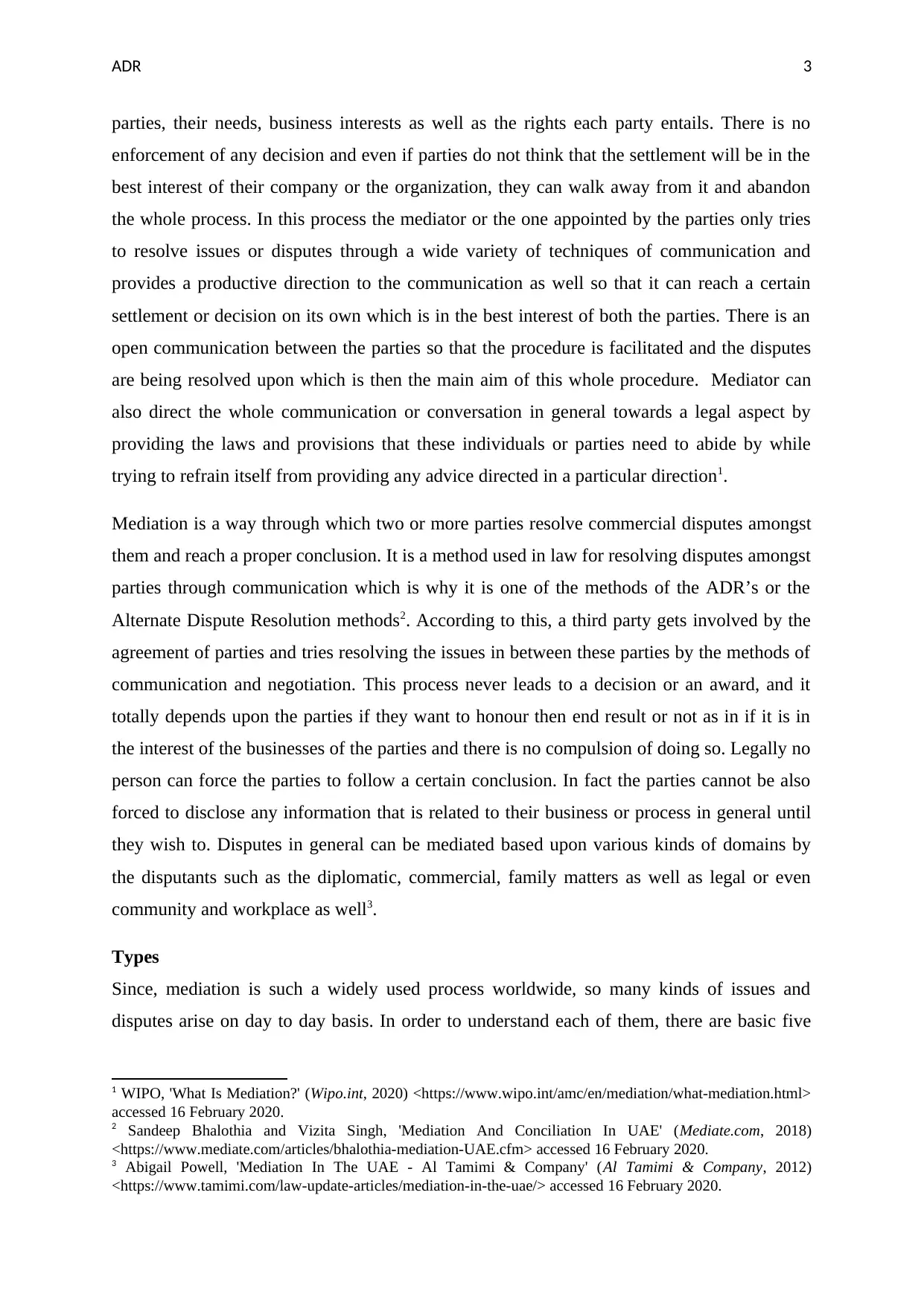
ADR 3
parties, their needs, business interests as well as the rights each party entails. There is no
enforcement of any decision and even if parties do not think that the settlement will be in the
best interest of their company or the organization, they can walk away from it and abandon
the whole process. In this process the mediator or the one appointed by the parties only tries
to resolve issues or disputes through a wide variety of techniques of communication and
provides a productive direction to the communication as well so that it can reach a certain
settlement or decision on its own which is in the best interest of both the parties. There is an
open communication between the parties so that the procedure is facilitated and the disputes
are being resolved upon which is then the main aim of this whole procedure. Mediator can
also direct the whole communication or conversation in general towards a legal aspect by
providing the laws and provisions that these individuals or parties need to abide by while
trying to refrain itself from providing any advice directed in a particular direction1.
Mediation is a way through which two or more parties resolve commercial disputes amongst
them and reach a proper conclusion. It is a method used in law for resolving disputes amongst
parties through communication which is why it is one of the methods of the ADR’s or the
Alternate Dispute Resolution methods2. According to this, a third party gets involved by the
agreement of parties and tries resolving the issues in between these parties by the methods of
communication and negotiation. This process never leads to a decision or an award, and it
totally depends upon the parties if they want to honour then end result or not as in if it is in
the interest of the businesses of the parties and there is no compulsion of doing so. Legally no
person can force the parties to follow a certain conclusion. In fact the parties cannot be also
forced to disclose any information that is related to their business or process in general until
they wish to. Disputes in general can be mediated based upon various kinds of domains by
the disputants such as the diplomatic, commercial, family matters as well as legal or even
community and workplace as well3.
Types
Since, mediation is such a widely used process worldwide, so many kinds of issues and
disputes arise on day to day basis. In order to understand each of them, there are basic five
1 WIPO, 'What Is Mediation?' (Wipo.int, 2020) <https://www.wipo.int/amc/en/mediation/what-mediation.html>
accessed 16 February 2020.
2 Sandeep Bhalothia and Vizita Singh, 'Mediation And Conciliation In UAE' (Mediate.com, 2018)
<https://www.mediate.com/articles/bhalothia-mediation-UAE.cfm> accessed 16 February 2020.
3 Abigail Powell, 'Mediation In The UAE - Al Tamimi & Company' (Al Tamimi & Company, 2012)
<https://www.tamimi.com/law-update-articles/mediation-in-the-uae/> accessed 16 February 2020.
parties, their needs, business interests as well as the rights each party entails. There is no
enforcement of any decision and even if parties do not think that the settlement will be in the
best interest of their company or the organization, they can walk away from it and abandon
the whole process. In this process the mediator or the one appointed by the parties only tries
to resolve issues or disputes through a wide variety of techniques of communication and
provides a productive direction to the communication as well so that it can reach a certain
settlement or decision on its own which is in the best interest of both the parties. There is an
open communication between the parties so that the procedure is facilitated and the disputes
are being resolved upon which is then the main aim of this whole procedure. Mediator can
also direct the whole communication or conversation in general towards a legal aspect by
providing the laws and provisions that these individuals or parties need to abide by while
trying to refrain itself from providing any advice directed in a particular direction1.
Mediation is a way through which two or more parties resolve commercial disputes amongst
them and reach a proper conclusion. It is a method used in law for resolving disputes amongst
parties through communication which is why it is one of the methods of the ADR’s or the
Alternate Dispute Resolution methods2. According to this, a third party gets involved by the
agreement of parties and tries resolving the issues in between these parties by the methods of
communication and negotiation. This process never leads to a decision or an award, and it
totally depends upon the parties if they want to honour then end result or not as in if it is in
the interest of the businesses of the parties and there is no compulsion of doing so. Legally no
person can force the parties to follow a certain conclusion. In fact the parties cannot be also
forced to disclose any information that is related to their business or process in general until
they wish to. Disputes in general can be mediated based upon various kinds of domains by
the disputants such as the diplomatic, commercial, family matters as well as legal or even
community and workplace as well3.
Types
Since, mediation is such a widely used process worldwide, so many kinds of issues and
disputes arise on day to day basis. In order to understand each of them, there are basic five
1 WIPO, 'What Is Mediation?' (Wipo.int, 2020) <https://www.wipo.int/amc/en/mediation/what-mediation.html>
accessed 16 February 2020.
2 Sandeep Bhalothia and Vizita Singh, 'Mediation And Conciliation In UAE' (Mediate.com, 2018)
<https://www.mediate.com/articles/bhalothia-mediation-UAE.cfm> accessed 16 February 2020.
3 Abigail Powell, 'Mediation In The UAE - Al Tamimi & Company' (Al Tamimi & Company, 2012)
<https://www.tamimi.com/law-update-articles/mediation-in-the-uae/> accessed 16 February 2020.
Paraphrase This Document
Need a fresh take? Get an instant paraphrase of this document with our AI Paraphraser
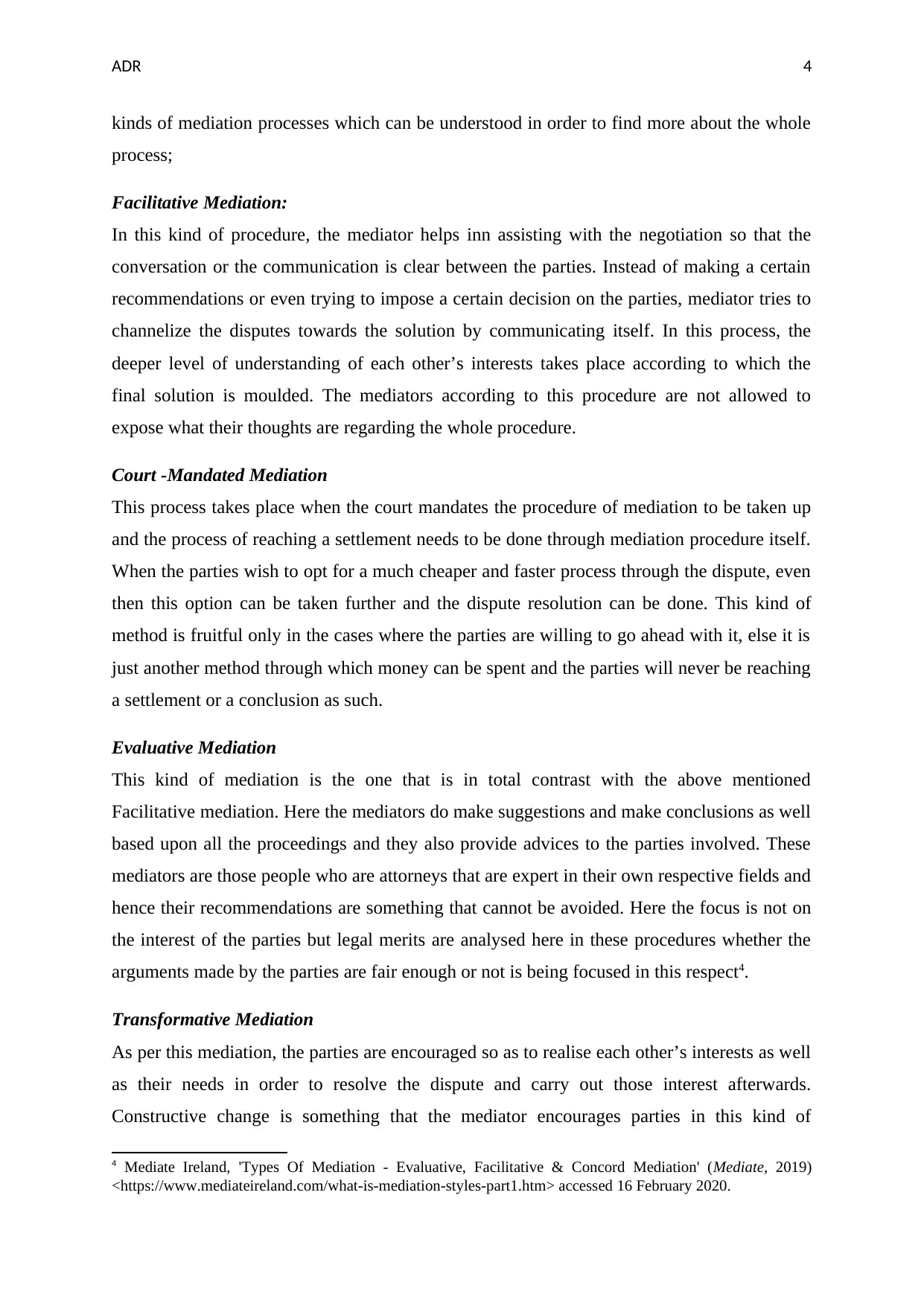
ADR 4
kinds of mediation processes which can be understood in order to find more about the whole
process;
Facilitative Mediation:
In this kind of procedure, the mediator helps inn assisting with the negotiation so that the
conversation or the communication is clear between the parties. Instead of making a certain
recommendations or even trying to impose a certain decision on the parties, mediator tries to
channelize the disputes towards the solution by communicating itself. In this process, the
deeper level of understanding of each other’s interests takes place according to which the
final solution is moulded. The mediators according to this procedure are not allowed to
expose what their thoughts are regarding the whole procedure.
Court -Mandated Mediation
This process takes place when the court mandates the procedure of mediation to be taken up
and the process of reaching a settlement needs to be done through mediation procedure itself.
When the parties wish to opt for a much cheaper and faster process through the dispute, even
then this option can be taken further and the dispute resolution can be done. This kind of
method is fruitful only in the cases where the parties are willing to go ahead with it, else it is
just another method through which money can be spent and the parties will never be reaching
a settlement or a conclusion as such.
Evaluative Mediation
This kind of mediation is the one that is in total contrast with the above mentioned
Facilitative mediation. Here the mediators do make suggestions and make conclusions as well
based upon all the proceedings and they also provide advices to the parties involved. These
mediators are those people who are attorneys that are expert in their own respective fields and
hence their recommendations are something that cannot be avoided. Here the focus is not on
the interest of the parties but legal merits are analysed here in these procedures whether the
arguments made by the parties are fair enough or not is being focused in this respect4.
Transformative Mediation
As per this mediation, the parties are encouraged so as to realise each other’s interests as well
as their needs in order to resolve the dispute and carry out those interest afterwards.
Constructive change is something that the mediator encourages parties in this kind of
4 Mediate Ireland, 'Types Of Mediation - Evaluative, Facilitative & Concord Mediation' (Mediate, 2019)
<https://www.mediateireland.com/what-is-mediation-styles-part1.htm> accessed 16 February 2020.
kinds of mediation processes which can be understood in order to find more about the whole
process;
Facilitative Mediation:
In this kind of procedure, the mediator helps inn assisting with the negotiation so that the
conversation or the communication is clear between the parties. Instead of making a certain
recommendations or even trying to impose a certain decision on the parties, mediator tries to
channelize the disputes towards the solution by communicating itself. In this process, the
deeper level of understanding of each other’s interests takes place according to which the
final solution is moulded. The mediators according to this procedure are not allowed to
expose what their thoughts are regarding the whole procedure.
Court -Mandated Mediation
This process takes place when the court mandates the procedure of mediation to be taken up
and the process of reaching a settlement needs to be done through mediation procedure itself.
When the parties wish to opt for a much cheaper and faster process through the dispute, even
then this option can be taken further and the dispute resolution can be done. This kind of
method is fruitful only in the cases where the parties are willing to go ahead with it, else it is
just another method through which money can be spent and the parties will never be reaching
a settlement or a conclusion as such.
Evaluative Mediation
This kind of mediation is the one that is in total contrast with the above mentioned
Facilitative mediation. Here the mediators do make suggestions and make conclusions as well
based upon all the proceedings and they also provide advices to the parties involved. These
mediators are those people who are attorneys that are expert in their own respective fields and
hence their recommendations are something that cannot be avoided. Here the focus is not on
the interest of the parties but legal merits are analysed here in these procedures whether the
arguments made by the parties are fair enough or not is being focused in this respect4.
Transformative Mediation
As per this mediation, the parties are encouraged so as to realise each other’s interests as well
as their needs in order to resolve the dispute and carry out those interest afterwards.
Constructive change is something that the mediator encourages parties in this kind of
4 Mediate Ireland, 'Types Of Mediation - Evaluative, Facilitative & Concord Mediation' (Mediate, 2019)
<https://www.mediateireland.com/what-is-mediation-styles-part1.htm> accessed 16 February 2020.
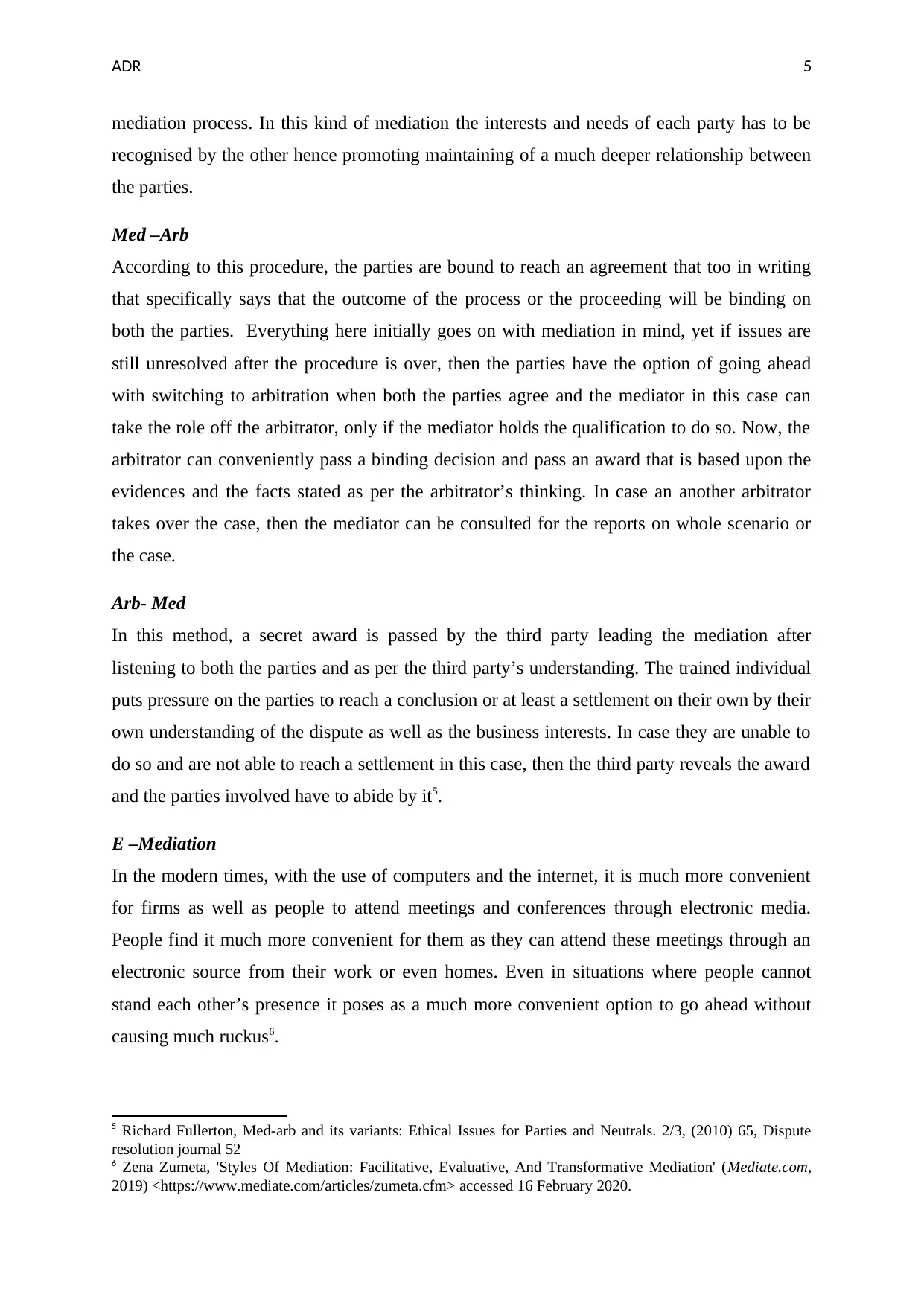
ADR 5
mediation process. In this kind of mediation the interests and needs of each party has to be
recognised by the other hence promoting maintaining of a much deeper relationship between
the parties.
Med –Arb
According to this procedure, the parties are bound to reach an agreement that too in writing
that specifically says that the outcome of the process or the proceeding will be binding on
both the parties. Everything here initially goes on with mediation in mind, yet if issues are
still unresolved after the procedure is over, then the parties have the option of going ahead
with switching to arbitration when both the parties agree and the mediator in this case can
take the role off the arbitrator, only if the mediator holds the qualification to do so. Now, the
arbitrator can conveniently pass a binding decision and pass an award that is based upon the
evidences and the facts stated as per the arbitrator’s thinking. In case an another arbitrator
takes over the case, then the mediator can be consulted for the reports on whole scenario or
the case.
Arb- Med
In this method, a secret award is passed by the third party leading the mediation after
listening to both the parties and as per the third party’s understanding. The trained individual
puts pressure on the parties to reach a conclusion or at least a settlement on their own by their
own understanding of the dispute as well as the business interests. In case they are unable to
do so and are not able to reach a settlement in this case, then the third party reveals the award
and the parties involved have to abide by it5.
E –Mediation
In the modern times, with the use of computers and the internet, it is much more convenient
for firms as well as people to attend meetings and conferences through electronic media.
People find it much more convenient for them as they can attend these meetings through an
electronic source from their work or even homes. Even in situations where people cannot
stand each other’s presence it poses as a much more convenient option to go ahead without
causing much ruckus6.
5 Richard Fullerton, Med-arb and its variants: Ethical Issues for Parties and Neutrals. 2/3, (2010) 65, Dispute
resolution journal 52
6 Zena Zumeta, 'Styles Of Mediation: Facilitative, Evaluative, And Transformative Mediation' (Mediate.com,
2019) <https://www.mediate.com/articles/zumeta.cfm> accessed 16 February 2020.
mediation process. In this kind of mediation the interests and needs of each party has to be
recognised by the other hence promoting maintaining of a much deeper relationship between
the parties.
Med –Arb
According to this procedure, the parties are bound to reach an agreement that too in writing
that specifically says that the outcome of the process or the proceeding will be binding on
both the parties. Everything here initially goes on with mediation in mind, yet if issues are
still unresolved after the procedure is over, then the parties have the option of going ahead
with switching to arbitration when both the parties agree and the mediator in this case can
take the role off the arbitrator, only if the mediator holds the qualification to do so. Now, the
arbitrator can conveniently pass a binding decision and pass an award that is based upon the
evidences and the facts stated as per the arbitrator’s thinking. In case an another arbitrator
takes over the case, then the mediator can be consulted for the reports on whole scenario or
the case.
Arb- Med
In this method, a secret award is passed by the third party leading the mediation after
listening to both the parties and as per the third party’s understanding. The trained individual
puts pressure on the parties to reach a conclusion or at least a settlement on their own by their
own understanding of the dispute as well as the business interests. In case they are unable to
do so and are not able to reach a settlement in this case, then the third party reveals the award
and the parties involved have to abide by it5.
E –Mediation
In the modern times, with the use of computers and the internet, it is much more convenient
for firms as well as people to attend meetings and conferences through electronic media.
People find it much more convenient for them as they can attend these meetings through an
electronic source from their work or even homes. Even in situations where people cannot
stand each other’s presence it poses as a much more convenient option to go ahead without
causing much ruckus6.
5 Richard Fullerton, Med-arb and its variants: Ethical Issues for Parties and Neutrals. 2/3, (2010) 65, Dispute
resolution journal 52
6 Zena Zumeta, 'Styles Of Mediation: Facilitative, Evaluative, And Transformative Mediation' (Mediate.com,
2019) <https://www.mediate.com/articles/zumeta.cfm> accessed 16 February 2020.
⊘ This is a preview!⊘
Do you want full access?
Subscribe today to unlock all pages.

Trusted by 1+ million students worldwide
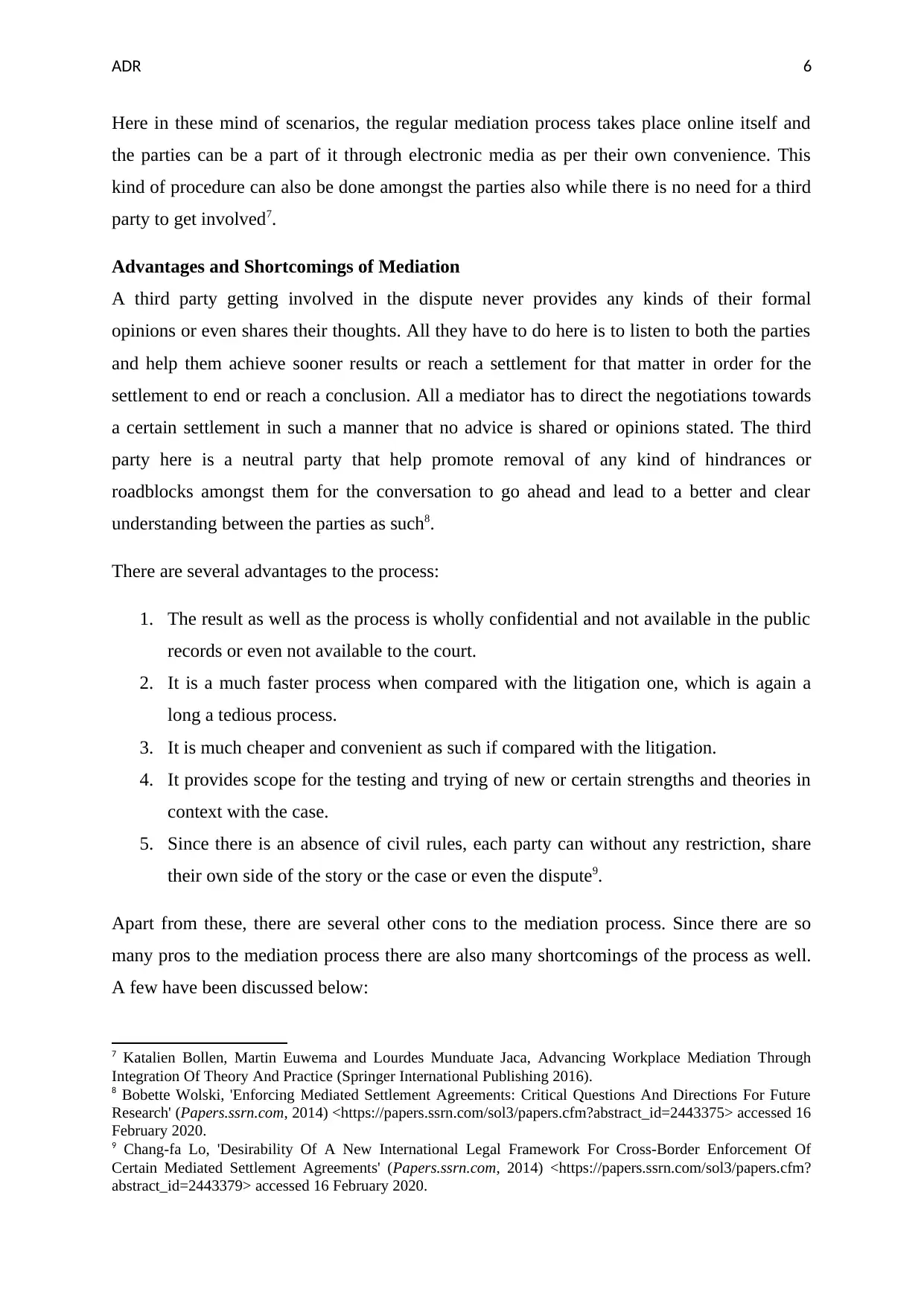
ADR 6
Here in these mind of scenarios, the regular mediation process takes place online itself and
the parties can be a part of it through electronic media as per their own convenience. This
kind of procedure can also be done amongst the parties also while there is no need for a third
party to get involved7.
Advantages and Shortcomings of Mediation
A third party getting involved in the dispute never provides any kinds of their formal
opinions or even shares their thoughts. All they have to do here is to listen to both the parties
and help them achieve sooner results or reach a settlement for that matter in order for the
settlement to end or reach a conclusion. All a mediator has to direct the negotiations towards
a certain settlement in such a manner that no advice is shared or opinions stated. The third
party here is a neutral party that help promote removal of any kind of hindrances or
roadblocks amongst them for the conversation to go ahead and lead to a better and clear
understanding between the parties as such8.
There are several advantages to the process:
1. The result as well as the process is wholly confidential and not available in the public
records or even not available to the court.
2. It is a much faster process when compared with the litigation one, which is again a
long a tedious process.
3. It is much cheaper and convenient as such if compared with the litigation.
4. It provides scope for the testing and trying of new or certain strengths and theories in
context with the case.
5. Since there is an absence of civil rules, each party can without any restriction, share
their own side of the story or the case or even the dispute9.
Apart from these, there are several other cons to the mediation process. Since there are so
many pros to the mediation process there are also many shortcomings of the process as well.
A few have been discussed below:
7 Katalien Bollen, Martin Euwema and Lourdes Munduate Jaca, Advancing Workplace Mediation Through
Integration Of Theory And Practice (Springer International Publishing 2016).
8 Bobette Wolski, 'Enforcing Mediated Settlement Agreements: Critical Questions And Directions For Future
Research' (Papers.ssrn.com, 2014) <https://papers.ssrn.com/sol3/papers.cfm?abstract_id=2443375> accessed 16
February 2020.
9 Chang-fa Lo, 'Desirability Of A New International Legal Framework For Cross-Border Enforcement Of
Certain Mediated Settlement Agreements' (Papers.ssrn.com, 2014) <https://papers.ssrn.com/sol3/papers.cfm?
abstract_id=2443379> accessed 16 February 2020.
Here in these mind of scenarios, the regular mediation process takes place online itself and
the parties can be a part of it through electronic media as per their own convenience. This
kind of procedure can also be done amongst the parties also while there is no need for a third
party to get involved7.
Advantages and Shortcomings of Mediation
A third party getting involved in the dispute never provides any kinds of their formal
opinions or even shares their thoughts. All they have to do here is to listen to both the parties
and help them achieve sooner results or reach a settlement for that matter in order for the
settlement to end or reach a conclusion. All a mediator has to direct the negotiations towards
a certain settlement in such a manner that no advice is shared or opinions stated. The third
party here is a neutral party that help promote removal of any kind of hindrances or
roadblocks amongst them for the conversation to go ahead and lead to a better and clear
understanding between the parties as such8.
There are several advantages to the process:
1. The result as well as the process is wholly confidential and not available in the public
records or even not available to the court.
2. It is a much faster process when compared with the litigation one, which is again a
long a tedious process.
3. It is much cheaper and convenient as such if compared with the litigation.
4. It provides scope for the testing and trying of new or certain strengths and theories in
context with the case.
5. Since there is an absence of civil rules, each party can without any restriction, share
their own side of the story or the case or even the dispute9.
Apart from these, there are several other cons to the mediation process. Since there are so
many pros to the mediation process there are also many shortcomings of the process as well.
A few have been discussed below:
7 Katalien Bollen, Martin Euwema and Lourdes Munduate Jaca, Advancing Workplace Mediation Through
Integration Of Theory And Practice (Springer International Publishing 2016).
8 Bobette Wolski, 'Enforcing Mediated Settlement Agreements: Critical Questions And Directions For Future
Research' (Papers.ssrn.com, 2014) <https://papers.ssrn.com/sol3/papers.cfm?abstract_id=2443375> accessed 16
February 2020.
9 Chang-fa Lo, 'Desirability Of A New International Legal Framework For Cross-Border Enforcement Of
Certain Mediated Settlement Agreements' (Papers.ssrn.com, 2014) <https://papers.ssrn.com/sol3/papers.cfm?
abstract_id=2443379> accessed 16 February 2020.
Paraphrase This Document
Need a fresh take? Get an instant paraphrase of this document with our AI Paraphraser
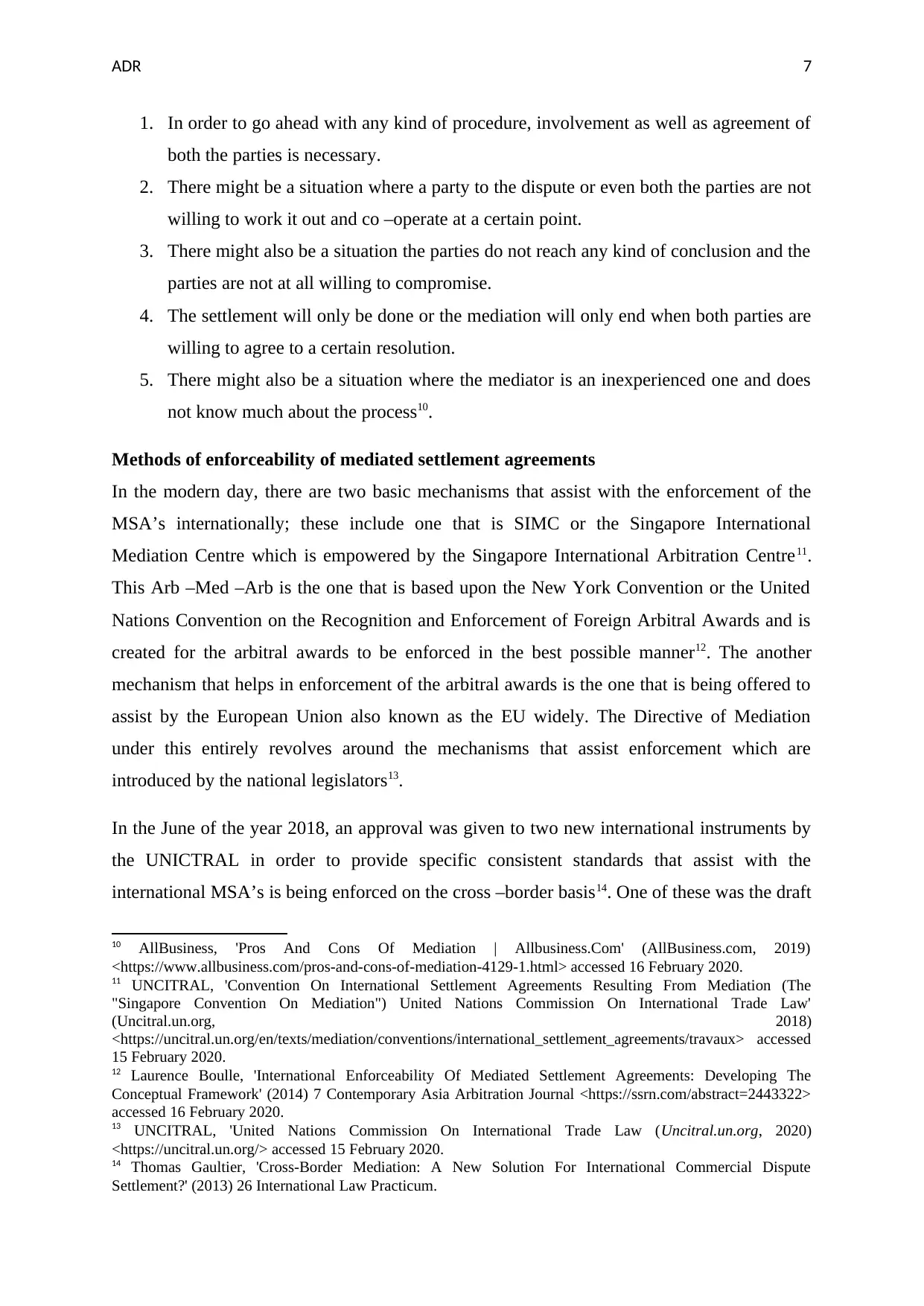
ADR 7
1. In order to go ahead with any kind of procedure, involvement as well as agreement of
both the parties is necessary.
2. There might be a situation where a party to the dispute or even both the parties are not
willing to work it out and co –operate at a certain point.
3. There might also be a situation the parties do not reach any kind of conclusion and the
parties are not at all willing to compromise.
4. The settlement will only be done or the mediation will only end when both parties are
willing to agree to a certain resolution.
5. There might also be a situation where the mediator is an inexperienced one and does
not know much about the process10.
Methods of enforceability of mediated settlement agreements
In the modern day, there are two basic mechanisms that assist with the enforcement of the
MSA’s internationally; these include one that is SIMC or the Singapore International
Mediation Centre which is empowered by the Singapore International Arbitration Centre11.
This Arb –Med –Arb is the one that is based upon the New York Convention or the United
Nations Convention on the Recognition and Enforcement of Foreign Arbitral Awards and is
created for the arbitral awards to be enforced in the best possible manner12. The another
mechanism that helps in enforcement of the arbitral awards is the one that is being offered to
assist by the European Union also known as the EU widely. The Directive of Mediation
under this entirely revolves around the mechanisms that assist enforcement which are
introduced by the national legislators13.
In the June of the year 2018, an approval was given to two new international instruments by
the UNICTRAL in order to provide specific consistent standards that assist with the
international MSA’s is being enforced on the cross –border basis14. One of these was the draft
10 AllBusiness, 'Pros And Cons Of Mediation | Allbusiness.Com' (AllBusiness.com, 2019)
<https://www.allbusiness.com/pros-and-cons-of-mediation-4129-1.html> accessed 16 February 2020.
11 UNCITRAL, 'Convention On International Settlement Agreements Resulting From Mediation (The
"Singapore Convention On Mediation") United Nations Commission On International Trade Law'
(Uncitral.un.org, 2018)
<https://uncitral.un.org/en/texts/mediation/conventions/international_settlement_agreements/travaux> accessed
15 February 2020.
12 Laurence Boulle, 'International Enforceability Of Mediated Settlement Agreements: Developing The
Conceptual Framework' (2014) 7 Contemporary Asia Arbitration Journal <https://ssrn.com/abstract=2443322>
accessed 16 February 2020.
13 UNCITRAL, 'United Nations Commission On International Trade Law (Uncitral.un.org, 2020)
<https://uncitral.un.org/> accessed 15 February 2020.
14 Thomas Gaultier, 'Cross-Border Mediation: A New Solution For International Commercial Dispute
Settlement?' (2013) 26 International Law Practicum.
1. In order to go ahead with any kind of procedure, involvement as well as agreement of
both the parties is necessary.
2. There might be a situation where a party to the dispute or even both the parties are not
willing to work it out and co –operate at a certain point.
3. There might also be a situation the parties do not reach any kind of conclusion and the
parties are not at all willing to compromise.
4. The settlement will only be done or the mediation will only end when both parties are
willing to agree to a certain resolution.
5. There might also be a situation where the mediator is an inexperienced one and does
not know much about the process10.
Methods of enforceability of mediated settlement agreements
In the modern day, there are two basic mechanisms that assist with the enforcement of the
MSA’s internationally; these include one that is SIMC or the Singapore International
Mediation Centre which is empowered by the Singapore International Arbitration Centre11.
This Arb –Med –Arb is the one that is based upon the New York Convention or the United
Nations Convention on the Recognition and Enforcement of Foreign Arbitral Awards and is
created for the arbitral awards to be enforced in the best possible manner12. The another
mechanism that helps in enforcement of the arbitral awards is the one that is being offered to
assist by the European Union also known as the EU widely. The Directive of Mediation
under this entirely revolves around the mechanisms that assist enforcement which are
introduced by the national legislators13.
In the June of the year 2018, an approval was given to two new international instruments by
the UNICTRAL in order to provide specific consistent standards that assist with the
international MSA’s is being enforced on the cross –border basis14. One of these was the draft
10 AllBusiness, 'Pros And Cons Of Mediation | Allbusiness.Com' (AllBusiness.com, 2019)
<https://www.allbusiness.com/pros-and-cons-of-mediation-4129-1.html> accessed 16 February 2020.
11 UNCITRAL, 'Convention On International Settlement Agreements Resulting From Mediation (The
"Singapore Convention On Mediation") United Nations Commission On International Trade Law'
(Uncitral.un.org, 2018)
<https://uncitral.un.org/en/texts/mediation/conventions/international_settlement_agreements/travaux> accessed
15 February 2020.
12 Laurence Boulle, 'International Enforceability Of Mediated Settlement Agreements: Developing The
Conceptual Framework' (2014) 7 Contemporary Asia Arbitration Journal <https://ssrn.com/abstract=2443322>
accessed 16 February 2020.
13 UNCITRAL, 'United Nations Commission On International Trade Law (Uncitral.un.org, 2020)
<https://uncitral.un.org/> accessed 15 February 2020.
14 Thomas Gaultier, 'Cross-Border Mediation: A New Solution For International Commercial Dispute
Settlement?' (2013) 26 International Law Practicum.
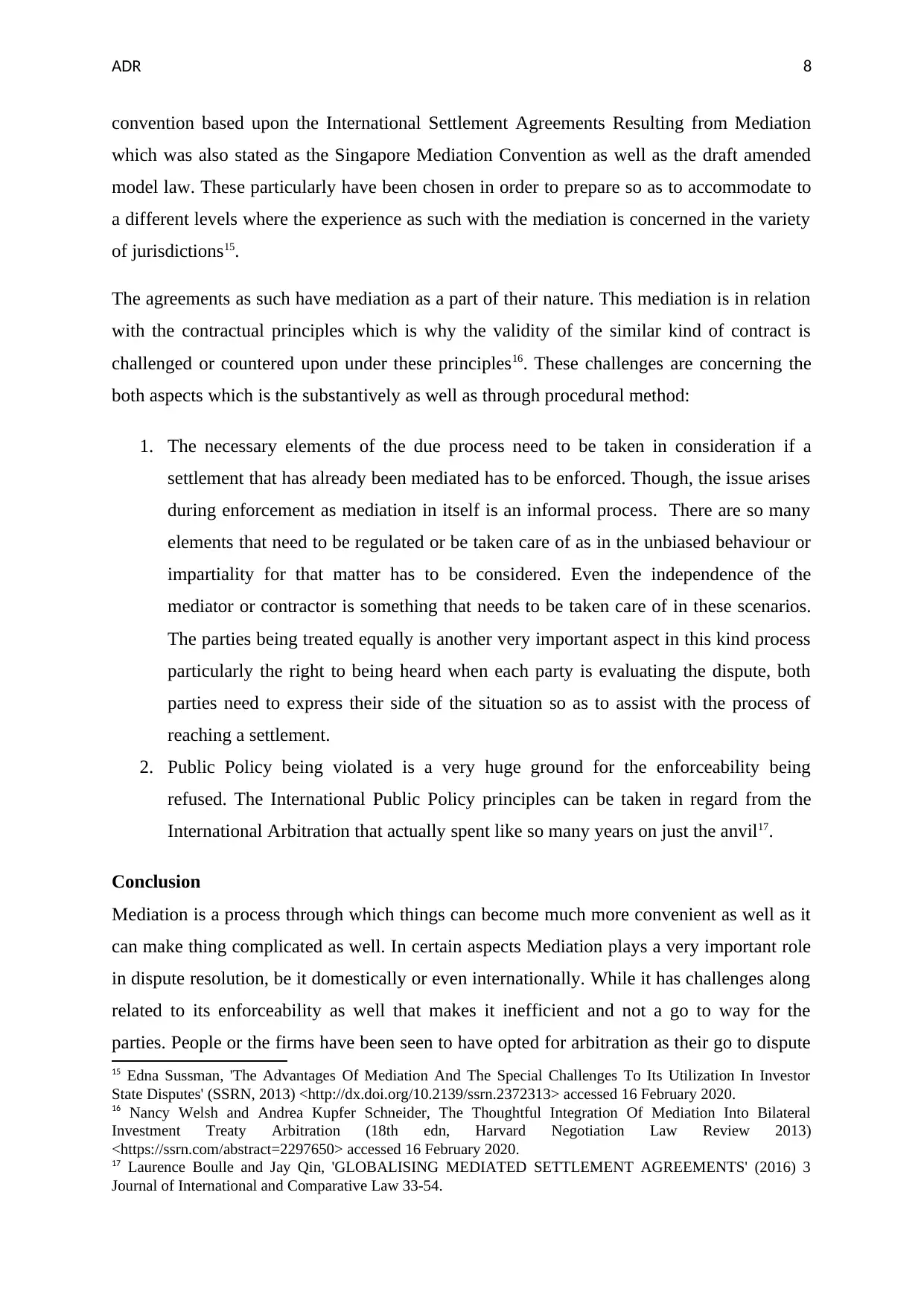
ADR 8
convention based upon the International Settlement Agreements Resulting from Mediation
which was also stated as the Singapore Mediation Convention as well as the draft amended
model law. These particularly have been chosen in order to prepare so as to accommodate to
a different levels where the experience as such with the mediation is concerned in the variety
of jurisdictions15.
The agreements as such have mediation as a part of their nature. This mediation is in relation
with the contractual principles which is why the validity of the similar kind of contract is
challenged or countered upon under these principles16. These challenges are concerning the
both aspects which is the substantively as well as through procedural method:
1. The necessary elements of the due process need to be taken in consideration if a
settlement that has already been mediated has to be enforced. Though, the issue arises
during enforcement as mediation in itself is an informal process. There are so many
elements that need to be regulated or be taken care of as in the unbiased behaviour or
impartiality for that matter has to be considered. Even the independence of the
mediator or contractor is something that needs to be taken care of in these scenarios.
The parties being treated equally is another very important aspect in this kind process
particularly the right to being heard when each party is evaluating the dispute, both
parties need to express their side of the situation so as to assist with the process of
reaching a settlement.
2. Public Policy being violated is a very huge ground for the enforceability being
refused. The International Public Policy principles can be taken in regard from the
International Arbitration that actually spent like so many years on just the anvil17.
Conclusion
Mediation is a process through which things can become much more convenient as well as it
can make thing complicated as well. In certain aspects Mediation plays a very important role
in dispute resolution, be it domestically or even internationally. While it has challenges along
related to its enforceability as well that makes it inefficient and not a go to way for the
parties. People or the firms have been seen to have opted for arbitration as their go to dispute
15 Edna Sussman, 'The Advantages Of Mediation And The Special Challenges To Its Utilization In Investor
State Disputes' (SSRN, 2013) <http://dx.doi.org/10.2139/ssrn.2372313> accessed 16 February 2020.
16 Nancy Welsh and Andrea Kupfer Schneider, The Thoughtful Integration Of Mediation Into Bilateral
Investment Treaty Arbitration (18th edn, Harvard Negotiation Law Review 2013)
<https://ssrn.com/abstract=2297650> accessed 16 February 2020.
17 Laurence Boulle and Jay Qin, 'GLOBALISING MEDIATED SETTLEMENT AGREEMENTS' (2016) 3
Journal of International and Comparative Law 33-54.
convention based upon the International Settlement Agreements Resulting from Mediation
which was also stated as the Singapore Mediation Convention as well as the draft amended
model law. These particularly have been chosen in order to prepare so as to accommodate to
a different levels where the experience as such with the mediation is concerned in the variety
of jurisdictions15.
The agreements as such have mediation as a part of their nature. This mediation is in relation
with the contractual principles which is why the validity of the similar kind of contract is
challenged or countered upon under these principles16. These challenges are concerning the
both aspects which is the substantively as well as through procedural method:
1. The necessary elements of the due process need to be taken in consideration if a
settlement that has already been mediated has to be enforced. Though, the issue arises
during enforcement as mediation in itself is an informal process. There are so many
elements that need to be regulated or be taken care of as in the unbiased behaviour or
impartiality for that matter has to be considered. Even the independence of the
mediator or contractor is something that needs to be taken care of in these scenarios.
The parties being treated equally is another very important aspect in this kind process
particularly the right to being heard when each party is evaluating the dispute, both
parties need to express their side of the situation so as to assist with the process of
reaching a settlement.
2. Public Policy being violated is a very huge ground for the enforceability being
refused. The International Public Policy principles can be taken in regard from the
International Arbitration that actually spent like so many years on just the anvil17.
Conclusion
Mediation is a process through which things can become much more convenient as well as it
can make thing complicated as well. In certain aspects Mediation plays a very important role
in dispute resolution, be it domestically or even internationally. While it has challenges along
related to its enforceability as well that makes it inefficient and not a go to way for the
parties. People or the firms have been seen to have opted for arbitration as their go to dispute
15 Edna Sussman, 'The Advantages Of Mediation And The Special Challenges To Its Utilization In Investor
State Disputes' (SSRN, 2013) <http://dx.doi.org/10.2139/ssrn.2372313> accessed 16 February 2020.
16 Nancy Welsh and Andrea Kupfer Schneider, The Thoughtful Integration Of Mediation Into Bilateral
Investment Treaty Arbitration (18th edn, Harvard Negotiation Law Review 2013)
<https://ssrn.com/abstract=2297650> accessed 16 February 2020.
17 Laurence Boulle and Jay Qin, 'GLOBALISING MEDIATED SETTLEMENT AGREEMENTS' (2016) 3
Journal of International and Comparative Law 33-54.
⊘ This is a preview!⊘
Do you want full access?
Subscribe today to unlock all pages.

Trusted by 1+ million students worldwide

ADR 9
resolution method instead. Despite everything, Mediation is still widely used throughout the
world and the parties can opt for so many options as per their own convenience. It is
something that has been as a part of Dispute resolution throughout the years. International
Mediation is something individuals can look forwards to in order to save time and money as
well instead of referring to the courts or proceeding with the whole litigation process.
resolution method instead. Despite everything, Mediation is still widely used throughout the
world and the parties can opt for so many options as per their own convenience. It is
something that has been as a part of Dispute resolution throughout the years. International
Mediation is something individuals can look forwards to in order to save time and money as
well instead of referring to the courts or proceeding with the whole litigation process.
Paraphrase This Document
Need a fresh take? Get an instant paraphrase of this document with our AI Paraphraser
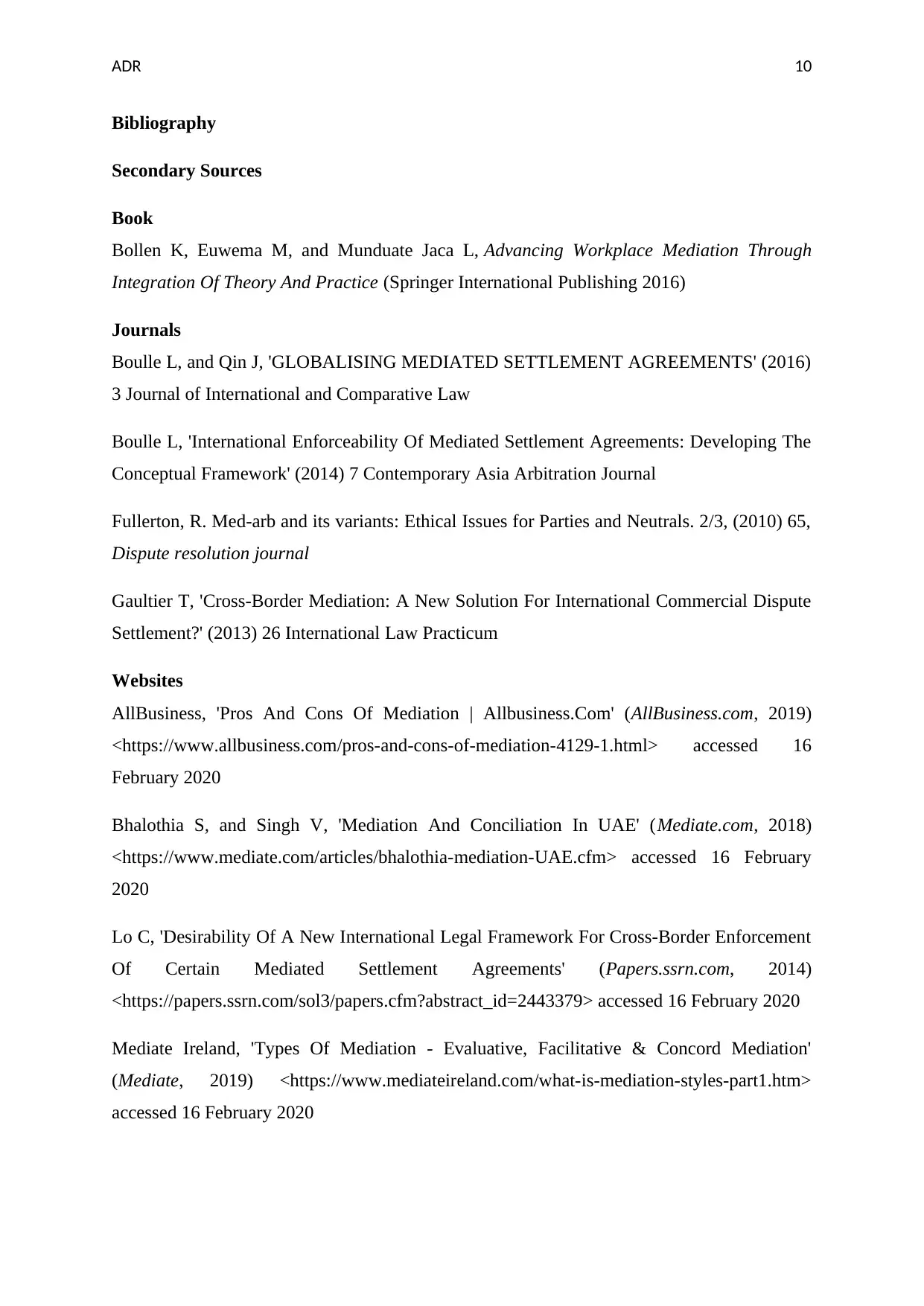
ADR 10
Bibliography
Secondary Sources
Book
Bollen K, Euwema M, and Munduate Jaca L, Advancing Workplace Mediation Through
Integration Of Theory And Practice (Springer International Publishing 2016)
Journals
Boulle L, and Qin J, 'GLOBALISING MEDIATED SETTLEMENT AGREEMENTS' (2016)
3 Journal of International and Comparative Law
Boulle L, 'International Enforceability Of Mediated Settlement Agreements: Developing The
Conceptual Framework' (2014) 7 Contemporary Asia Arbitration Journal
Fullerton, R. Med-arb and its variants: Ethical Issues for Parties and Neutrals. 2/3, (2010) 65,
Dispute resolution journal
Gaultier T, 'Cross-Border Mediation: A New Solution For International Commercial Dispute
Settlement?' (2013) 26 International Law Practicum
Websites
AllBusiness, 'Pros And Cons Of Mediation | Allbusiness.Com' (AllBusiness.com, 2019)
<https://www.allbusiness.com/pros-and-cons-of-mediation-4129-1.html> accessed 16
February 2020
Bhalothia S, and Singh V, 'Mediation And Conciliation In UAE' (Mediate.com, 2018)
<https://www.mediate.com/articles/bhalothia-mediation-UAE.cfm> accessed 16 February
2020
Lo C, 'Desirability Of A New International Legal Framework For Cross-Border Enforcement
Of Certain Mediated Settlement Agreements' (Papers.ssrn.com, 2014)
<https://papers.ssrn.com/sol3/papers.cfm?abstract_id=2443379> accessed 16 February 2020
Mediate Ireland, 'Types Of Mediation - Evaluative, Facilitative & Concord Mediation'
(Mediate, 2019) <https://www.mediateireland.com/what-is-mediation-styles-part1.htm>
accessed 16 February 2020
Bibliography
Secondary Sources
Book
Bollen K, Euwema M, and Munduate Jaca L, Advancing Workplace Mediation Through
Integration Of Theory And Practice (Springer International Publishing 2016)
Journals
Boulle L, and Qin J, 'GLOBALISING MEDIATED SETTLEMENT AGREEMENTS' (2016)
3 Journal of International and Comparative Law
Boulle L, 'International Enforceability Of Mediated Settlement Agreements: Developing The
Conceptual Framework' (2014) 7 Contemporary Asia Arbitration Journal
Fullerton, R. Med-arb and its variants: Ethical Issues for Parties and Neutrals. 2/3, (2010) 65,
Dispute resolution journal
Gaultier T, 'Cross-Border Mediation: A New Solution For International Commercial Dispute
Settlement?' (2013) 26 International Law Practicum
Websites
AllBusiness, 'Pros And Cons Of Mediation | Allbusiness.Com' (AllBusiness.com, 2019)
<https://www.allbusiness.com/pros-and-cons-of-mediation-4129-1.html> accessed 16
February 2020
Bhalothia S, and Singh V, 'Mediation And Conciliation In UAE' (Mediate.com, 2018)
<https://www.mediate.com/articles/bhalothia-mediation-UAE.cfm> accessed 16 February
2020
Lo C, 'Desirability Of A New International Legal Framework For Cross-Border Enforcement
Of Certain Mediated Settlement Agreements' (Papers.ssrn.com, 2014)
<https://papers.ssrn.com/sol3/papers.cfm?abstract_id=2443379> accessed 16 February 2020
Mediate Ireland, 'Types Of Mediation - Evaluative, Facilitative & Concord Mediation'
(Mediate, 2019) <https://www.mediateireland.com/what-is-mediation-styles-part1.htm>
accessed 16 February 2020
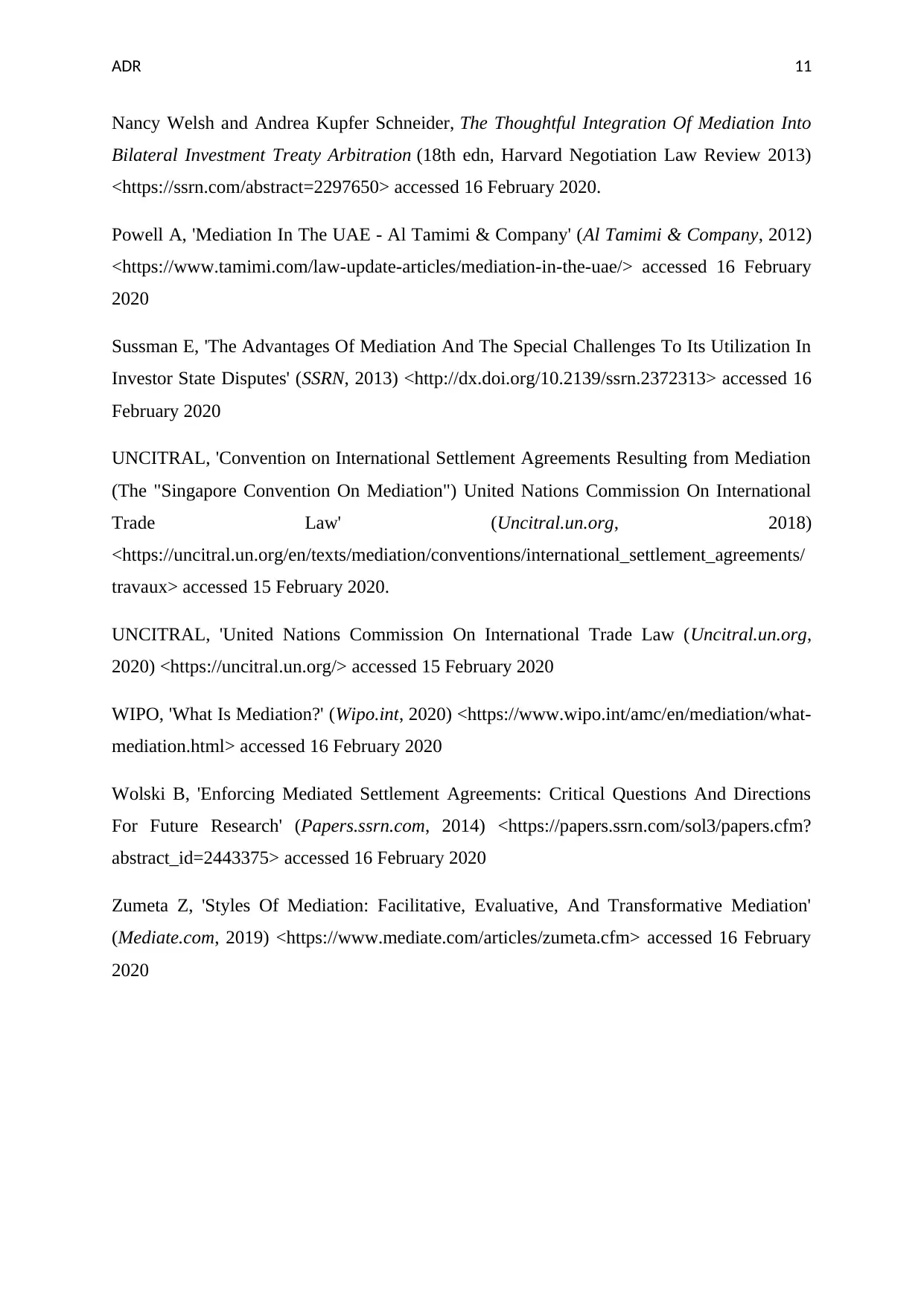
ADR 11
Nancy Welsh and Andrea Kupfer Schneider, The Thoughtful Integration Of Mediation Into
Bilateral Investment Treaty Arbitration (18th edn, Harvard Negotiation Law Review 2013)
<https://ssrn.com/abstract=2297650> accessed 16 February 2020.
Powell A, 'Mediation In The UAE - Al Tamimi & Company' (Al Tamimi & Company, 2012)
<https://www.tamimi.com/law-update-articles/mediation-in-the-uae/> accessed 16 February
2020
Sussman E, 'The Advantages Of Mediation And The Special Challenges To Its Utilization In
Investor State Disputes' (SSRN, 2013) <http://dx.doi.org/10.2139/ssrn.2372313> accessed 16
February 2020
UNCITRAL, 'Convention on International Settlement Agreements Resulting from Mediation
(The "Singapore Convention On Mediation") United Nations Commission On International
Trade Law' (Uncitral.un.org, 2018)
<https://uncitral.un.org/en/texts/mediation/conventions/international_settlement_agreements/
travaux> accessed 15 February 2020.
UNCITRAL, 'United Nations Commission On International Trade Law (Uncitral.un.org,
2020) <https://uncitral.un.org/> accessed 15 February 2020
WIPO, 'What Is Mediation?' (Wipo.int, 2020) <https://www.wipo.int/amc/en/mediation/what-
mediation.html> accessed 16 February 2020
Wolski B, 'Enforcing Mediated Settlement Agreements: Critical Questions And Directions
For Future Research' (Papers.ssrn.com, 2014) <https://papers.ssrn.com/sol3/papers.cfm?
abstract_id=2443375> accessed 16 February 2020
Zumeta Z, 'Styles Of Mediation: Facilitative, Evaluative, And Transformative Mediation'
(Mediate.com, 2019) <https://www.mediate.com/articles/zumeta.cfm> accessed 16 February
2020
Nancy Welsh and Andrea Kupfer Schneider, The Thoughtful Integration Of Mediation Into
Bilateral Investment Treaty Arbitration (18th edn, Harvard Negotiation Law Review 2013)
<https://ssrn.com/abstract=2297650> accessed 16 February 2020.
Powell A, 'Mediation In The UAE - Al Tamimi & Company' (Al Tamimi & Company, 2012)
<https://www.tamimi.com/law-update-articles/mediation-in-the-uae/> accessed 16 February
2020
Sussman E, 'The Advantages Of Mediation And The Special Challenges To Its Utilization In
Investor State Disputes' (SSRN, 2013) <http://dx.doi.org/10.2139/ssrn.2372313> accessed 16
February 2020
UNCITRAL, 'Convention on International Settlement Agreements Resulting from Mediation
(The "Singapore Convention On Mediation") United Nations Commission On International
Trade Law' (Uncitral.un.org, 2018)
<https://uncitral.un.org/en/texts/mediation/conventions/international_settlement_agreements/
travaux> accessed 15 February 2020.
UNCITRAL, 'United Nations Commission On International Trade Law (Uncitral.un.org,
2020) <https://uncitral.un.org/> accessed 15 February 2020
WIPO, 'What Is Mediation?' (Wipo.int, 2020) <https://www.wipo.int/amc/en/mediation/what-
mediation.html> accessed 16 February 2020
Wolski B, 'Enforcing Mediated Settlement Agreements: Critical Questions And Directions
For Future Research' (Papers.ssrn.com, 2014) <https://papers.ssrn.com/sol3/papers.cfm?
abstract_id=2443375> accessed 16 February 2020
Zumeta Z, 'Styles Of Mediation: Facilitative, Evaluative, And Transformative Mediation'
(Mediate.com, 2019) <https://www.mediate.com/articles/zumeta.cfm> accessed 16 February
2020
⊘ This is a preview!⊘
Do you want full access?
Subscribe today to unlock all pages.

Trusted by 1+ million students worldwide
1 out of 12
Related Documents
Your All-in-One AI-Powered Toolkit for Academic Success.
+13062052269
info@desklib.com
Available 24*7 on WhatsApp / Email
![[object Object]](/_next/static/media/star-bottom.7253800d.svg)
Unlock your academic potential
Copyright © 2020–2026 A2Z Services. All Rights Reserved. Developed and managed by ZUCOL.





